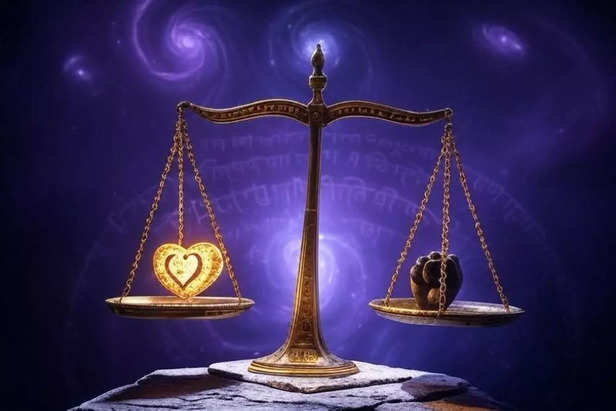Karma Exposed! Life Is Not As Fair As You Think!
Yuvraj Nanda | Mar 12, 2025, 00:06 IST
Depiction of Karmic cycle, AI generated.
Karma is often seen as life’s balancing force, ensuring justice for all. But does it really work that way? The reality is far more complex. This article challenges the traditional view of karma, exposing why life isn’t always fair and why some people seem to escape consequences while others suffer despite their good deeds.
Karma. One of the most highly comforting beliefs which so many people around us hold. The idea that what you put into the world, morally and ethically will come back to you is the primary definition of Karma apart from its actual impact that deals with human effort. The faith that good “deeds” lead to rewards, and bad actions bring consequences is a very simple and satisfying concept that offers moral balance and a lot of mental relief to people.
However, the reality is what has a different story to offer. Why do some corrupt people thrive and why do so many of good-hearted individuals suffer? If karma and its energy was truly fair, wouldn’t every action find its perfect reaction? The true statement is that karma is often misinterpreted and on ground reality, it is far from the automatic justice system we want it to be.
People absolutely love the idea of “cosmic justice”—that the universe somehow has a built-in moral compass. This belief is deeply ingrained in religions, folklore, and even pop culture these days, reinforcing the idea that good will eventually always triumph over evil.
But let’s look around. History is full of violent dictators who died rich, criminals who escaped punishment, and hardworking people who never got what they really deserved. Meanwhile, many people who lie, cheat, and manipulate often enjoy success without facing any visible consequences. However, this does not mean that lying, cheating and manipulation is the correct way to live but simply means that one must be a good person for simply being a good person, and not for any divine rewards.
But if karma were truly a universal law, shouldn’t the balance be obvious? Instead, life often seems to favor the ruthless who have power while ignoring the virtuous who are helpless. This proves that karma, at least in the way we often interpret it, is not as automatic or predictable as we’d like to believe.
![A man sits in deep grief, AI generated.]()
Another flaw in the idea of karma is the assumption that being morally good leads to good results in all aspects. Many people live their lives with honesty, work hard, and treat others with kindness—yet they struggle financially, face heartbreaks, or deal with endless obstacles. Meanwhile, those who cut corners, deceive others, or exploit situations sometimes get ahead faster.
This doesn’t mean goodness is pointless. It just means life is driven by more than just moral justice. Luck or privilege or connections or strategy—all can play roles in shaping outcomes. Simply “being a good person” does not guarantee success to us, just as being bad does not always lead to downfall.
• A brilliant artist may struggle to gain recognition while a mediocre influencer goes viral overnight.
• A kind-hearted entrepreneur may fail due to market conditions, while a shady businessman makes millions.
• A selfish person may attract wealth and admiration, while a generous soul faces constant betrayal.
Karma might exist in our imagination, but in the real world, cause and effect are more complicated than simple moral equations as we understand them.
So,
![A depiction of Karmic concept, AI generated.]()
If karma is not an automatic divine or cosmic force of justice, then does it have any sort of truth to it? Yes—but not in the way most people think about it.
Rather than a supernatural system of rewards and punishments, karma can be better understood as the long-term impact of actions. If you consistently treat people around you well but with a sense of self respect, you’re more likely to build meaningful relationships. If you cheat and deceive, people may eventually turn against you. But this is a probability like almost everything else, not a guarantee.
Life is very unpredictable, messy, complex, often unfair but still blissful if you seek beauty in it. Karma is not our vending machine where we insert good deeds and instantly receive rewards—for believing in this is a highly delusional and self comforting thought. Instead, it is a philosophy that encourages people to make better choices in their lives, even if the outcomes aren’t always what they expect.
The real truth? You do not get what you deserve. You get what you aim for, work for, and sometimes just what chance allows.
![An image of a free man in joy, AI generated.]()
Well, to ask someone to rely on a thought with minimal ground reality and more faith is not a wise suggestion. Rather than waiting for karma to balance things out, it is much better to take control of your own fate. Don’t expect life to be fair—make it work for you as much as you can based on what is in your control.
• Do good because you choose to, not because you expect rewards.
• Protect yourself from blindly trusting that justice will always prevail.
• Take action in your own life instead of waiting for karma to punish the bad and reward the good.
At the end of the day, life does not operate on simple equations of right and wrong. Karma is not your safety net—your choices, efforts, and resilience are.
However, the reality is what has a different story to offer. Why do some corrupt people thrive and why do so many of good-hearted individuals suffer? If karma and its energy was truly fair, wouldn’t every action find its perfect reaction? The true statement is that karma is often misinterpreted and on ground reality, it is far from the automatic justice system we want it to be.
The Myth of a Fair Universe
But let’s look around. History is full of violent dictators who died rich, criminals who escaped punishment, and hardworking people who never got what they really deserved. Meanwhile, many people who lie, cheat, and manipulate often enjoy success without facing any visible consequences. However, this does not mean that lying, cheating and manipulation is the correct way to live but simply means that one must be a good person for simply being a good person, and not for any divine rewards.
But if karma were truly a universal law, shouldn’t the balance be obvious? Instead, life often seems to favor the ruthless who have power while ignoring the virtuous who are helpless. This proves that karma, at least in the way we often interpret it, is not as automatic or predictable as we’d like to believe.
Effort vs. Outcome: Why Good Doesn’t Always Win

A man sits in deep grief, AI generated.
Another flaw in the idea of karma is the assumption that being morally good leads to good results in all aspects. Many people live their lives with honesty, work hard, and treat others with kindness—yet they struggle financially, face heartbreaks, or deal with endless obstacles. Meanwhile, those who cut corners, deceive others, or exploit situations sometimes get ahead faster.
This doesn’t mean goodness is pointless. It just means life is driven by more than just moral justice. Luck or privilege or connections or strategy—all can play roles in shaping outcomes. Simply “being a good person” does not guarantee success to us, just as being bad does not always lead to downfall.
• A brilliant artist may struggle to gain recognition while a mediocre influencer goes viral overnight.
• A kind-hearted entrepreneur may fail due to market conditions, while a shady businessman makes millions.
• A selfish person may attract wealth and admiration, while a generous soul faces constant betrayal.
Karma might exist in our imagination, but in the real world, cause and effect are more complicated than simple moral equations as we understand them.
So, Does Karma Exist at All?

A depiction of Karmic concept, AI generated.
If karma is not an automatic divine or cosmic force of justice, then does it have any sort of truth to it? Yes—but not in the way most people think about it.
Rather than a supernatural system of rewards and punishments, karma can be better understood as the long-term impact of actions. If you consistently treat people around you well but with a sense of self respect, you’re more likely to build meaningful relationships. If you cheat and deceive, people may eventually turn against you. But this is a probability like almost everything else, not a guarantee.
Life is very unpredictable, messy, complex, often unfair but still blissful if you seek beauty in it. Karma is not our vending machine where we insert good deeds and instantly receive rewards—for believing in this is a highly delusional and self comforting thought. Instead, it is a philosophy that encourages people to make better choices in their lives, even if the outcomes aren’t always what they expect.
The real truth? You do not get what you deserve. You get what you aim for, work for, and sometimes just what chance allows.
Conclusion: The Power of Self-Made Karma

An image of a free man in joy, AI generated.
Well, to ask someone to rely on a thought with minimal ground reality and more faith is not a wise suggestion. Rather than waiting for karma to balance things out, it is much better to take control of your own fate. Don’t expect life to be fair—make it work for you as much as you can based on what is in your control.
• Do good because you choose to, not because you expect rewards.
• Protect yourself from blindly trusting that justice will always prevail.
• Take action in your own life instead of waiting for karma to punish the bad and reward the good.
At the end of the day, life does not operate on simple equations of right and wrong. Karma is not your safety net—your choices, efforts, and resilience are.
